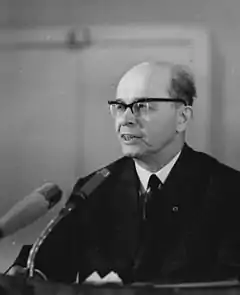Alexander Abusch
Alexander Abusch (14 February, 1902 – 27 January, 1982).[1] He was a German journalist, non-fiction writer, and politician.

According to one source he was born into a Jewish family in Kraków, Kingdom of Galicia and Lodomeria, Austria-Hungary.[1] According to another source, he was born in Nuremberg,[2] where, in the suburb of Gostenhof, he grew up, attended school, served his apprenticeship and had his first full-time job.[1] His father worked as a Coachman and scrap metal dealer, and later opened a hat shop. His mother also worked as a small trader.[1]
Abusch joined the Communist Party of Germany (KPD) in 1918. He was editor of several KPD publications. In 1937, he became part of the exiled KPD leadership in Paris, later in Toulouse. In 1941, he moved to Mexico, where he became a member of the Free Germany Movement. Between 1948 and 1950 he was part of the party leadership of the Socialist Unity Party of Germany. Between 1958 and 1961 he served as Minister of Culture of the German Democratic Republic (East Germany).[3] It was in his role as Minister of Culture that he ordered the demolition of princely castle of Putbus on Rügen, which was considered the most beautiful in Mecklenburg-Western Pomerania.[4]
References
- Karin Hartewig; Bernd-Rainer Barth. "Abusch, Alexander * 14.2.1902, † 27.1.1982 Minister für Kultur" (in German). Bundesstiftung zur Aufarbeitung der SED-Diktatur: Biographische Datenbanken. Retrieved 24 July 2015.
- Cross-Section: Anthology of the PEN Centre German Democratic Republic Edition Leipzig, 1970. p. 18.
- "Abusch, Alexander (1902-1982)". Das Bundesarchiv (German Federal Archives). 2004-2005. Retrieved 16 October 2009.
- Ralph Sommer, Verein will Schloss Putbus auf Rügen wieder aufbauen, Nordkurier, 8 December 2019
| Wikimedia Commons has media related to Alexander Abusch. |